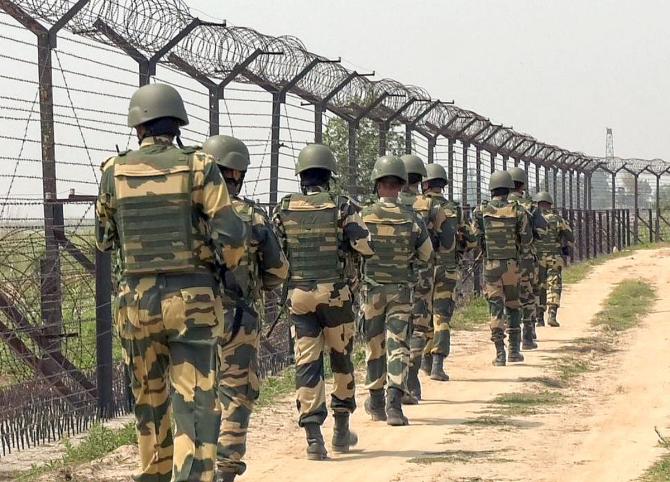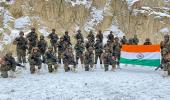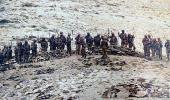Border guarding forces deployed along the front with Pakistan, Bangladesh, Nepal and other neighbouring countries have been directed to keep a check on "illegal encroachments" and possible suspicious activities in their area of operation that may pose a security threat to the nation, official sources said on Tuesday.

The issue was discussed and a plan of action was finalised during a 'Chintan Shivir' of IPS officers working in the Central Armed Police Forces and National Security Guard that was held in New Delhi on Monday under the chairmanship of Union Home Minister Amit Shah.
Sources privy to the meeting told PTI that the top brass and other senior commanders of these forces were asked to keep a strict vigil against any illegal encroachment taking place in their respective areas of operations.
In case a suspect installation or facility is detected, central agencies like the Intelligence Bureau and the Research and Analysis Wing should be "immediately" informed, they said.
The state authorities concerned like district administration, the police and intelligence setup should also be made aware about these activities and it should be ensured that any nefarious structure or activity is not allowed to continue, the sources said.
The senior officers of these forces like the Border Security Force, Indo Tibetan Border Police, Sashastra Seema Bal, Central Reserve Police Force and Central Industrial Security Force, apart from the NSG, were asked to ensure "strict compliance" on this subject, they said.
The Border Security Force guards Indian fronts with Pakistan and Bangladesh, the Indo-Tibetan Border Police is the designated frontier guarding force along the Chinese Line of Actual Control while the Sashastra Seema Bal mans the fronts with Nepal and Bhutan.
These forces, as part of their intelligence gathering exercise, have earlier reported about suspicious warehouses, godowns, buildings and religious centres coming up close to the border and have expressed concerns about their activities vis-a-vis the security along the fronts they guard, a senior CAPF officer said.
The Central Reserve Police Force, the Central Industrial Security Force and the National Security Guard too have permanent and temporary bases across the length and breadth of the country.
They have also been directed to keep a check on such illegal and doubtful facilities and activities and follow the same protocol of informing the central and state intelligence agencies and ensuring that such activities are checked and stopped, he said.
The ministry also directed that the forces should fill all their "non-general duty" posts by December this year and the recruitment rules should be amended so that state board pass candidates are given "priority" in the CAPF exams held in their respective regions.
Non-general duty posts are those related to administrative and assistance services that aid the armed combatants of these forces to render their primary task of undertaking anti-Maoist and counter-terrorism operations apart from a variety of internal security duties.
The border guarding forces have also been directed to prepare a 2000-year history of the village and region where they are deployed, as part of the 'Sarhad ko Jane' (know your border) theme. These records will subsequently be used for the training of the troops, the sources said.
These forces, during the 'Chintan Shivir', were also asked to make it "mandatory" that at least one hour of physical exercises, games and activities should be undertaken at all CAPF and NSG bases under the theme of ek ghanta mitti ke saath, the sources said.
As part of the environmental responsibility of these more than 10-lakh-personnel-strong forces, the CAPFs have been asked to plant as many trees as they can and ensure that proper care is taken of the saplings so that they are "not just a figure on the files".
The forces have been asked to devise a mechanism so that each jawan is given the responsibility to "nurture" at least five trees in his camp and they should be encouraged to "give names" to these trees like they name their children, the meeting decided, according to the sources.
It should also be explored if a sapling could be planted when there is a birth, death or any other important event in the family of the jawans, they said.
The 'Chintan Shivir' also decided to open a chain of CAPF hospitals for holding public outpatient department consultations and the locals of the area should be made aware about this new health facility that would be available to them apart from the local health care setup, they said.
The meeting also asked the senior officers of these forces to "show empathy" while dealing with issues related to the welfare of jawans and suggested that commanders should participate in sports activities and have dinner and lunch with their subordinates to "strengthen the bond of camaraderie".











 © 2025
© 2025